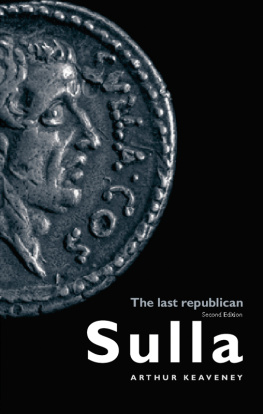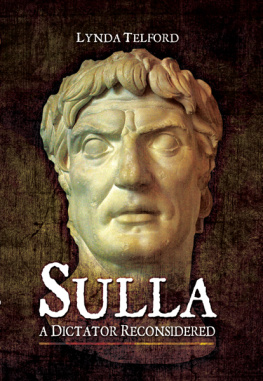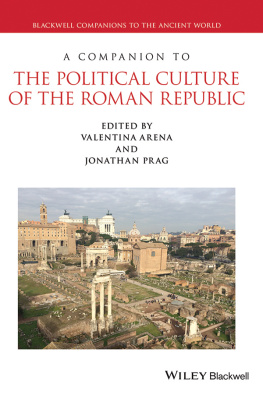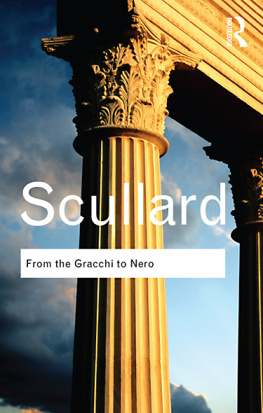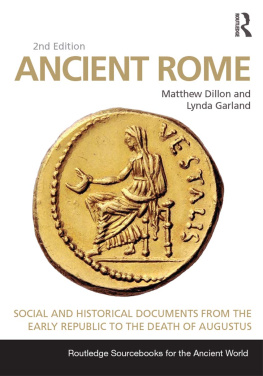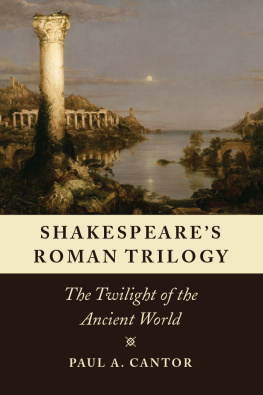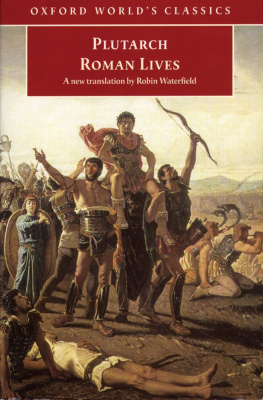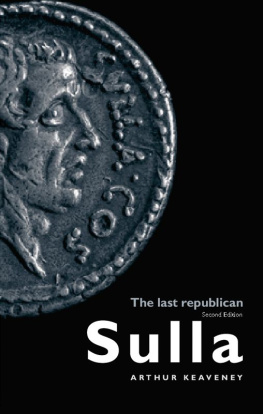SULLA
Sulla is one of the most controversial figures of the Roman republic. A brilliant military leader devoted to the ideal of Romes destiny, he has often been portrayed as simply a tyrant or despot. Arthur Keaveneys biography, first published more than twenty years ago, overturned that view in favour of a more complex portrait of a man obsessed with the belief that he was the recipient of divine favour Sulla Felix. Sulla rose from poverty and obscurity to become the master of the Roman world. He was not a crude forerunner of the emperors but a statesman who had long pondered the ills that beset Rome. His dictatorship was dedicated to bringing in laws for the better ordering of the republic. Despite his achievements and his integrity, Sullas constitution did not last and was swept away within a generation. In this second edition of Keaveneys biography, the text has been extensively rewritten and the findings of two decades of scholarship have been fully integrated. Written in a lively and entertaining style, designed to satisfy scholars as well as to inform students, the book introduces this pivotal figure of the late republic to a new generation of readers.
Arthur Keaveney is Senior Lecturer in Classical Studies at the University of Kent at Canterbury. Amongst his books are Rome and the Unification of Italy (1987), Lucullus: A Life (1992) and The Life and Journey of Athenian Statesman Themistocles as a Refugee in Persia (2003).
SULLA
The last republican
Second edition
Arthur Keaveney

First published 1982
by Croom Helm
This edition published 2005
by Routledge
2 Park Square, Milton Park, Abingdon, Oxon OX14 4RN
Simultaneously published in the USA and Canada
by Routledge
270 Madison Ave, New York, NY 10016
Routledge is an imprint of the Taylor & Francis Group
1982, 2005 Arthur Keaveney
All rights reserved. No part of this book may be reprinted or reproduced or utilised in any form or by any electronic, mechanical, or other means, now known or hereafter invented, including photocopying and recording, or in any information storage or retrieval system, without permission in writing from the publishers.
British Library Cataloguing in Publication Data
A catalogue record for this book is available from the British Library
Library of Congress Cataloging in Publication Data
Keaveney, Arthur.
Sulla, the last republican / Arthur Keaveney. 2nd ed.
p. cm.
Includes bibliographical references and index.
1. Sulla, Lucius Cornelius. 2 RomeHistoryRepublic, 26530 B.C.
3. StatesmanRomeBiography. I. Title.
DG256.7.K42 2005
937.05092dc22
ISBN 0415336600 (hbk)
ISBN 0415336619 (pbk)
FOR JENNY
Preface to the First Edition
Since G. P. Baker published his semi-popular Sulla the Fortunate (London 1927) there has been, so far as I am aware, no full biography of Sulla in any major European language. This neglect, all the more surprising in view of the amount of attention which lesser figures like Crassus have received of late, means that Sulla is now one of the few major figures of the late Roman republic to lack a modern biography. The present work is intended to make good, in however imperfect a fashion, that deficiency. In writing it, I have tried to keep as wide an audience as possible in mind. Scholars, I dare to hope, may find here one or two items that contribute to our understanding of this important figure. At the same time, I should like to believe that the book will offer students a reasonably reliable account of Sullas life and actions. Finally, if that ill-defined creature, the general reader, should wish to learn something of one of the most fascinating characters in antiquity, he or she will not, I trust, be repelled by a too austere presentation. Throughout I have tried to present Sulla as a real and living person. I have little sympathy with that type of biography of an ancient which, however good its scholarship, portrays its subject as a bloodless ghost or (worse) reduces it to dullness. Nor, self-evidently, can I share the view, currently fashionable in some places, that ancient history should not be written through the medium of a biography. Whether for good or ill, great personalities do stamp their impression on the age in which they live and it is, therefore, legitimate for us to enquire into the nature of the impact Sulla made on his times.
The work represents a substantial revision of my thesis Sulla a biography, which was prepared under the direction of Professor A. F. Norman and awarded a PhD by the University of Hull in 1978. Writing began at the University College of Wales, Aberystwyth during my tenure (19789) of a University of Wales Doctoral Fellowship and was completed here at Kent. The extracts from Plutarch are reprinted by permission of Penguin Books Ltd from Plutarch: Fall of the Roman Republic, translated by Rex Warner (Penguin Classics, revised edition, 1972) pp. 45, 66, 83, 102, 108, Copyright Rex Warner, 1958. The map of the battlefield of Chaeronea is reproduced by kind permission of Professor N. G. L. Hammond. For the other maps, which are not intended to be exhaustive but to serve as a general guide for the reader of the text, I am indebted to my wife, to Jim Styles and John West and to Jane Gregory. I also wish to express my appreciation to Mrs Elfi Corbett who typed the bulk of the manuscript.
Finally it remains for me to say that I alone am responsible for this books shortcomings.
Arthur Keaveney
Darwin College
University of Kent at Canterbury
Preface to the Second Edition
I have read somewhere or other that Ralph Waldo Emerson, a sage who is unlikely to have had much time for Sulla, declared that to be great is to be misunderstood. When I first wrote this book I took Sullas greatness as given and addressed myself to the task of providing a better understanding of the man than was then available. The book has been out of print for some time but I have never lost touch with Sulla and today see no reason to alter the view I formed then of the man and his place in history. However, twenty years of scholarship means that on certain episodes and details I have changed my position. Where I have not, I have either made a brief reply to criticisms which have been entered or at least indicated where an opposing viewpoint may be found.
This edition has been made possible by individuals not institutions. Richard Stoneman who commissioned the original book commissioned this version. At an early stage Charles Young gave advice on IT matters. Jake Weekes introduced me to Will Foster who drew the maps. My greatest debt however, is owed to Aisling Halligan whose patience and skill prepared the text. Rath D uirthi.
Arthur Keaveney
University of Kent
July 2004
The World of Sulla
On a day in 88,
After several centuries of steady advance and conquest culminating in the destruction of her greatest rival, Carthage, in 146, Rome, by the time of Sullas birth, had achieved total mastery of the Mediterranean basin, since such few states in the area as retained their independence did so by her leave. This vast empire was ruled from Rome itself, whence the officials who governed the provinces in her name issued at regular intervals. The complicated constitution of the governing city itself won the praise of the Greek historian Polybius who discerned in it elements of the democracy, the oligarchy and the kingship. Power, in theory, rested with the democratic element, the people. It was they who, in their assemblies, passed all laws and elected the state officials or magistrates. The chief of these magistrates, the two consuls, represented a kind of kingship for Polybius since, although elected for only a year, they possessed, during that period, the very widest powers. The Senate could be seen as the oligarchical component. This body was composed of ex-magistrates and was, in origin, a purely consultative assembly to be summoned by certain of the magistrates when they needed to seek its advice.
Next page
